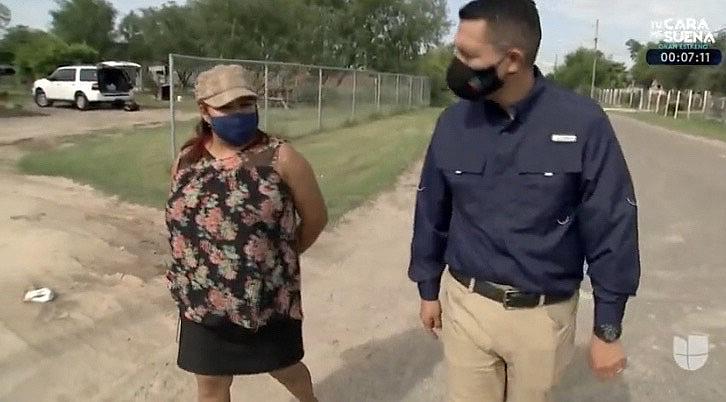Univision reporter shines a light on deep disparities in the colonias of South Texas

Univision National correspondent Pedro Rojas speaks to a resident of a colonia in South Texas.
(Photo by Pedro Rojas/Univision)
The lack of health insurance and proper immigration documents has made living in the South Texas colonias almost a death sentence since the beginning of the COVID-19 pandemic. Many residents have already experienced the loss of a close relative or friend.
The colonias are the poorest communities in the area. According to local elected officials, the residents of the colonias represent 38% of the region’s total population and the majority live below the national level poverty.
During the planning and production of this 2020 National Fellowship project, I decided to reach out to a local non-governmental organization based in San Juan, Texas called La Union del Pueblo Entero, or LUPE. I knew the organization had volunteer members living in those communities, and that they might be a great help in identifying and locating participants for the survey I’d planned to conduct to determine the needs, challenges and realities facing the residents of colonias.
Soon enough, I realized that due to the limitations imposed by COVID-19, I would have to use social media to communicate with the participants in the survey. With the help of the LUPE volunteers, we decided that we would use WhatsApp to engage with residents of the colonias and provide them with the survey questions.
After I obtained their answers and tabulated the survey results, I found that 41% of the residents had lost their jobs, another 41% do not have access to the internet, and 15% have either lost a relative or a close friend during the COVID-19 pandemic.
Later, with the help of LUPE volunteers, I selected four families that participated in the survey to be interviewed during the filming stage of my project. I arrange for all my visits to be done outdoors, right outside of their houses, following social distancing guidelines. With help from my colleague and news photographer Gilbert Garcia, I was able to document on video the poor living conditions in the colonias. We used a drone as well to show the vast geographical area the colonias cover in the region.
It was a humbling and rewarding experience to meet each of these families in person and find out firsthand about their needs, fears and major challenges. I also interviewed U.S. Rep. Vicente Gonzalez (D-McAllen); Hidalgo County Judge Rick Cortez, and a local infectious decease doctor, Ricardo Garcia, who has treated thousands of patients that have suffered from COVID-19.
I found that the stories of the residents of the colonias reflect the much larger group of American families living in poor conditions. In many regions, they live outside of the city limits, and so local governments tend to ignore or devote less attention to addressing their needs.
Thus far the COVID-19 pandemic has left 2,145 residents dead in Hidalgo County, which continues to have the second-highest number of fatalities in the state of Texas. According to the state, there are more than 2,294 colonias in Texas, collectively with over 500,000 residents. Nearly 100,000 are children, and 85% of the minors are U.S citizens.
My fellowship project “Vivir y Morir en las Colonias,” or “Live and Die in the Colonias,” was broadcast nationwide on Oct. 3, on “Aqui y Ahora,” a national news magazine TV show that airs every Sunday evening on the Univision News Network. It’s also online on the Univision.com website.
After the project aired, LUPE received a $24,000 grant from Justice for Migrant Women. The money was distributed among 55 families from the two colonias where we conducted our fellowship project survey. LUPE is also tracking how the county government is investing $20 million, allocated from the CARES Act to improve internet access.
It was an honor to produce and report on this issue that continues to impact the poorest communities in south Texas. The experience has widened my views of news coverage that can not only inform but reveal the deep social disparities present in our country.

